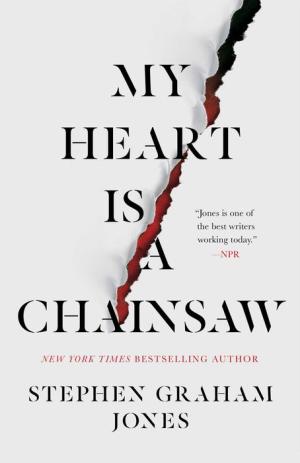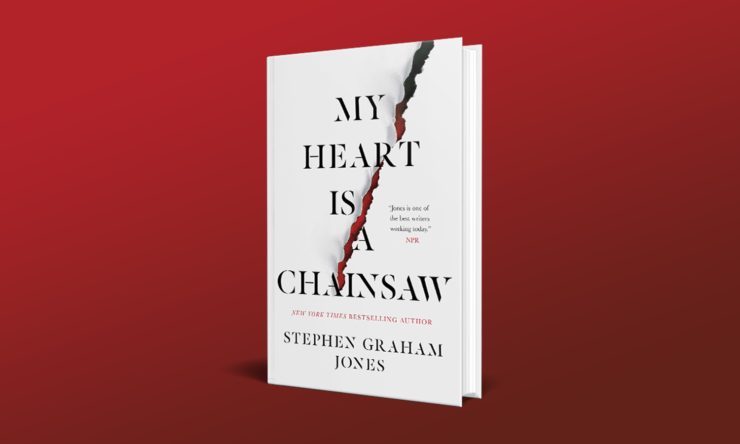Jade Daniels—or, JD—is a horror-obsessed loner staggering through the final months of her senior year of high school in rural Proofrock, Idaho. She writes extra-credit papers on “Slasher 101” for her history teacher to boost her grades, works as a custodian for the county after school, and avoids being home too often. Sometimes she camps out at the rundown remains of Camp Blood, site of a real-life slasher incident, waiting with baited breath—either to turn eighteen so she can skip town or for another cycle of killings to kick off.
So when a couple of young tourists go missing at the same time a conglomerate of wealthy families, the Founders, break ground across the town lake for their “Terra Nova” housing project, Jade can’t believe her luck. Signs are lining up, including the arrival of Letha Mondragon, whom Jade assumes must be the fresh final girl: she’s handsome, naïve, kind, blush-inducing. Unfortunately, the town’s gruesome histories are influencing the direction of this burgeoning horror flick, and getting stuck in the cycle isn’t as much of a relief as it was in Jade’s fantasies.
My Heart is a Chainsaw, on the most obvious level, is a gloriously metafictional love-letter to slasher films. Each chapter has a referential title, such as “Don’t Go In the Woods,” and is followed by one of Jade’s brief “Slasher 101” reports—plus, within the narration, Jade consistently frames herself and the events occurring in her life through the rules of her favored genre. And if you’re starting to guess from the emphasis on ‘genre rules’ that My Heart is a Chainsaw aims for more than a mere reflection of the tropes: you’re spot-on. Stephan Graham Jones’s simultaneous adoration for as well as critique of “the slasher” shines through the whole book in well-balanced measure.
One central theme revolves around what people use stories for: how we frame our experiences through the tales that wedge under our skin, especially when we need them most. Jade’s attachment to slashers is tangled up with her traumatic childhood and her hunger for both revenge and survival. However, it’s worth noting that she cannot begin to imagine herself as the protagonist—the avenging final girl—for at least the first half of the novel. On the one hand, she doesn’t see herself as pure enough, as the “right” kind of girl… but on the other, she longs to be rescued for once in her life. And she does think she’d adore witnessing some bloodshed in the name of justice—a desire that is messily complicated.
Buy the Book


My Heart Is a Chainsaw
Stories are there for Jade when nothing else is. I appreciated that the novel doesn’t pathologize the connection it engages between trauma and horror fandom—instead, it’s presented as reasonable and life-sustaining. Similarly the fact of Jade being, in her words, half-Indian (and queer, or so it appears) are just casual background rather than being narratively causal. Though in the end she can’t shove her personal slasher cycle—supernatural and mundane all at once—into the rules structure she’s been clinging to, the stories she loves give her a foothold to survive, as well as a language to communicate her trauma to the people who enter her life. (Isn’t that, on some level, why we’re all reading books like these?)
Spoilers follow.
However, while the close third person perspective locks the narration onto Jade’s perception of the world, the book itself isn’t actually focused on coming of age… but parenting. Jones imbues the novel with a powerful sense of the care that adults owe the children in their midst while mercilessly delineating the ways the community, with some partial exceptions, has failed to care for Jade. She presents herself as grown and in “don’t mother hen me in the name of authority” conflict with folks like Mr. Holmes the history teacher or Hardy the sheriff—but Jones’s precise attention to description and dialogue allows the reader to see around the corners Jade doesn’t. The audience witnesses the efforts specific people make to care for her, as much as she’ll allow, even though it’s far from enough. Because as a whole, the community has failed Jade.
The novel’s implicit argument for the communal care responsibilities of adults comes into sharp focus in one particular scene. After Letha shares the content of Jade’s letters with Hardy, implicating Jade’s father for sexual abuse, Mr. Holmes tries to engage with Jade on the terms she’s set—using horror movies as the metaphor—and asks her the reason she’s never written him paper about a rape-revenge film. While Letha and Hardy are more concerned with holding her father accountable, Mr. Holmes turns his attention to how Jade sees herself in the story. He asks her about the rules of the genre and the reason she doesn’t consider rape-revenge within her slasher justice purview.
Eventually Jade says,
“The reason rape-revenge isn’t a slasher is that the slasher and the final girl would have to be the same person. […] The final girl and the spirit of vengeance are in opposition, not the same jumpsuit. That’d—that’d be like Batman peeling his cowl off and being the Joker. Just doesn’t work.”
Balancing the fact that Jade is a seventeen year old girl who deserves access to care and support alongside her powerful, dedicated self-reliance is something Jones handles with real tenderness. “Tenderness” might be a strange word to use about a slasher novel with a brutal third-act body count, but given Jones’s indictment of shit fathers and implicit argument for the potential of men to do better by girls, it seems apt. After all, when the chips fall and the tropes dissolve, Jade gets to take a machete to her rapist dad. She enacts her revenge as the hybrid slasher and final girl.
But the novel doesn’t end there.
As with the reprisal of Alice-on-the-lake imagery in Jade’s narration, or the through-going references to the Scream films, the triumphal moment when the final girl ends the spree isn’t the conclusion. Jade’s friends and supporters are mutilated or dead; her town is about to be consumed by either water or fire; she’s been caught on camera straight-up killing her dad. The novel ends on the image of her trapped on the roof of the dam’s management station, watching a mother bear cover the body of her cub to protect it from an aggressive rogue male—an act of protection she hasn’t believed in since she was a child.
The finale of My Heart is a Chainsaw left me feeling as if I, too, had plunged into open air through the chaos—hanging there under the night sky, suspended in smoke and fire. Jones doesn’t offer a clean resolution for Jade or her community, torn to shreds by incursion from wealthy outsiders as well as the miserable secrets of child abuse and neglect—and the reverberations of systemic violence against Indigenous peoples—held within the town’s present and past. Instead the reader has to gather up those threads and sift through the emotions the novel raises. I closed the book aching with tenderness for Jade, but also nauseously unsettled—haunted, one might say, by those complicated leftovers of justice and trauma.
My Heart Is a Chainsaw is available from Gallery / Saga Press.
Lee Mandelo is a writer, critic, and editor whose primary fields of interest are speculative fiction and queer literature, especially when the two coincide. They have two books out, Beyond Binary: Genderqueer and Sexually Fluid Speculative Fiction and We Wuz Pushed: On Joanna Russ and Radical Truth-telling, and in the past have edited for publications like Strange Horizons Magazine. Other work has been featured in magazines such as Stone Telling, Clarkesworld, Apex, and Ideomancer.










